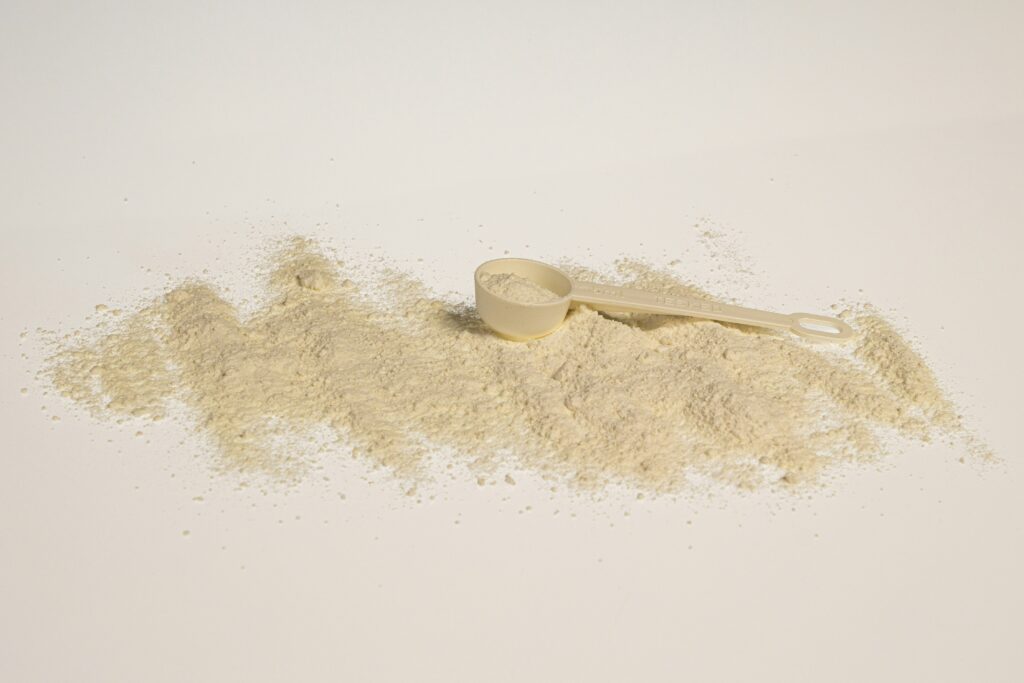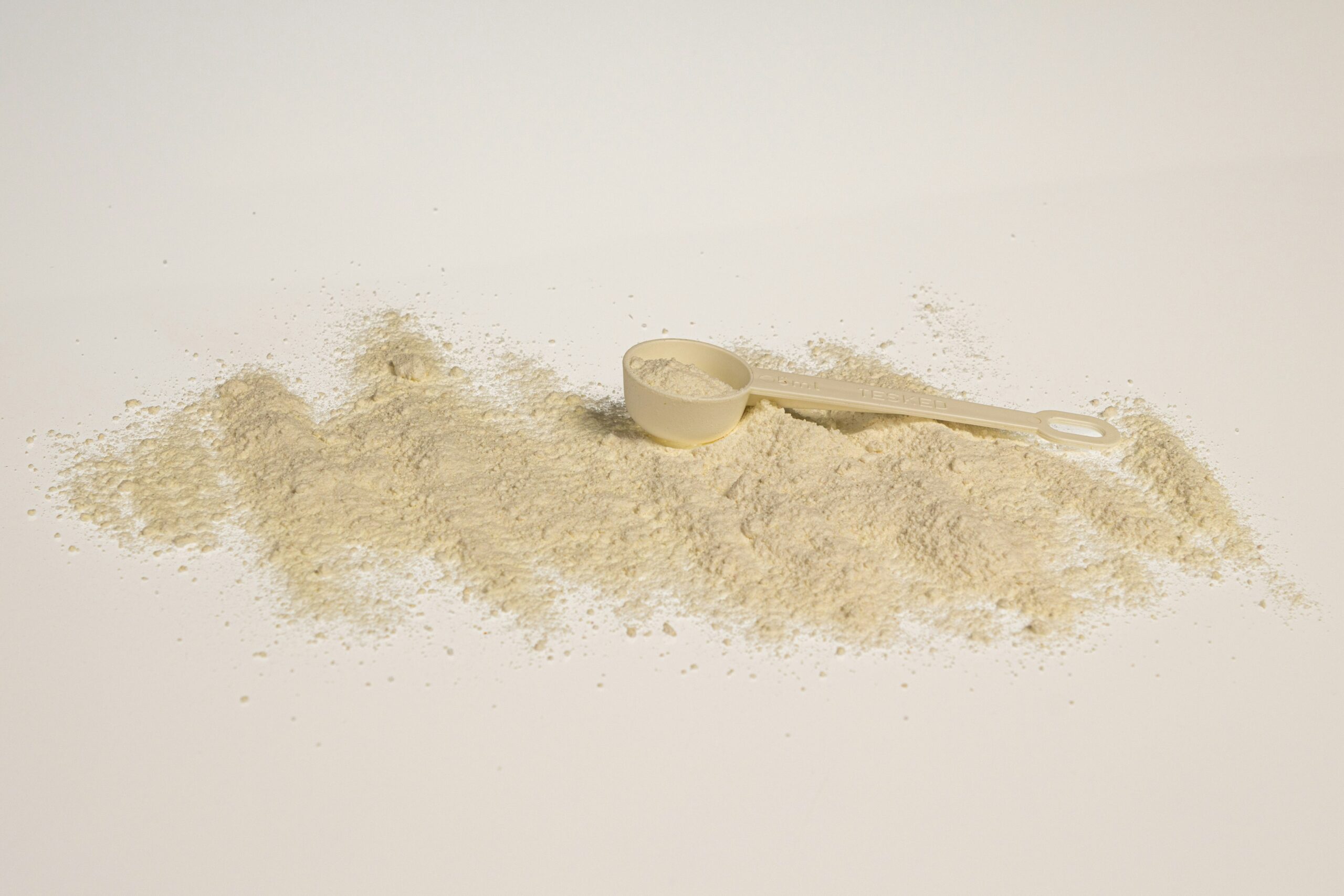
Protein is for everyone, but what about protein powder? Do you actually need a protein powder? Protein powders are often thought of as nutritional supplements for athletes. This is completely understandable because most protein powders focus on selling their products to athletes. But, while athletes do need more protein than most people, everybody needs to consume a minimum amount of protein every day for good health.
In this blog post we’ll go over what protein is and how to calculate your personal protein needs. Then, when you know how much you need, you can see how much protein is found in different foods and [see whether or not you can benefit from protein powder and] how to choose from the vast array of protein powders available on the market.
What is protein?
Protein is an essential nutrient that everyone needs every day. Protein, along with carbohydrates and fats, is considered to be a macronutrient because you need more of these every day than the micronutrients like vitamins and minerals. Plus, it’s these macronutrients that contribute to our daily need for [energy/fuel/calories].
The protein compound itself is made from several building blocks called amino acids. There are over 20 different amino acids, 9 of which are considered to be essential and must be consumed daily. That’s because you don’t store excess protein and amino acids in your body, so you need a constant supply of them. Protein sources that contain all nine essential amino acids are called complete proteins, and those that may be low in one or two are called incomplete proteins.
Protein is so important for good health that your body naturally contains over 10,000 different proteins. Protein is critical for all parts of your body including your muscles, bones, skin, hair, enzymes, blood, hormones, etc. Protein helps with so many functions including promoting bone and muscle mass and strength, healing burns and wounds, and having a strong immune system. Some studies show that consuming enough protein each day can help you stay fuller longer, and may help with managing weight.
How much protein do you need every day?
The RDA for protein is 0.8 grams of protein for every kg of body weight. This means that if you weigh 70 kg (154 lb), you need 56 grams of protein every day. If you weigh 90 kg (198 lb), then you need 72 grams of protein every day.
These are the bare minimum requirements for most people, and not what I recommend for optimal health. As we know, general recommendations are often not the best for optimizing overall health. For optimal health, most active women should consume 1.2 to 2.0 grams of protein per kilogram of body weight. This means that a 70 kg (154 lb) woman needs 84-140 grams of protein every day, while a 60 kg (132 lb) woman needs 62-120 grams of protein every day.
There are times in a woman’s life where you might need to adjust your protein intake as your protein demands are higher. These include during the menstrual cycle, pregnancy, breastfeeding, perimenopause and menopause, and during periods of intense training or heavy exercise.
Fun Fact: According to the Office of Dietary Supplements, high-protein diets (e.g., those that have two to three times the recommended daily allowance of protein) [seem to be/are] safe. Recent research shows that high-protein diets don’t increase the risk of kidney stones, kidney function, dehydration, nor do they negatively impact bone health.
How much protein is in common foods?
When thinking of protein-rich foods, you may think of meat, eggs, seafood, and dairy. These are some of the foods that contain the highest amounts of protein. But did you know that protein is also found in many plant foods including legumes, nuts, seeds, and grains—and there is even some protein in vegetables and fruit?
Here is a list of the amount of protein per serving in a few higher-protein foods:
- 33 g protein in 4 oz of sirloin steak
- 30 g protein in 4 oz of grilled sockeye salmon
- 28 g protein in 4 oz skinless chicken thigh
- 25 g protein in 4 eggs
- 18 g protein in 1 cup of cooked lentils
- 8 g protein in 8 oz milk
- 6 g protein in 1 oz of dry roasted almonds
Animal sources of protein are considered to be complete proteins because they contain all 9 essential amino acids. Some plant-based proteins are also considered to be complete, like soy, quinoa, and chia seeds. However, in order to get complete protein from other plant sources that may lack one or more amino acids, simply mix up you diet by eating a variety of plant foods every day to get enough of all of your essential amino acids. [Another bonus is that eating more plant-based foods can be good for your health and the planet’s health because plants contain a variety of nutrients (like fiber), they don’t contain cholesterol, and the production of plant-based foods releases fewer greenhouse gases.]
Not everyone gets the right amount of protein from food. Some who experience food insecurity, have certain dietary restrictions, or malnutrition often do not get enough protein. Others may get more than enough protein, especially if they eat a lot of animal-based foods. Many people can get enough protein by eating a variety of nutritious foods throughout the day. However, as with any nutrient, if you aren’t able to get enough from your diet, you may benefit from supplementation.
Choosing the right protein powder for you
Protein powders are convenient sources of protein and often have added vitamins, minerals, sweeteners, and other ingredients. Different protein powders may contain protein from several different sources, and the amount of protein per scoop can vary between products. In the U.S., nutritional supplements—including protein powders—are not regulated.Some protein powders have been found to contain contaminants like heavy metals. These are the reasons why it’s important to read the nutrition labels and get a recommendation for a high-quality product from a healthcare professional that you trust before you change your supplementation regimen.
Here is a brief overview of some of the most common types of protein powders.
Whey or casein protein powder
Whey and casein are made from milk and should be avoided if you are allergic, sensitive to, or otherwise avoiding dairy. These animal-based proteins contain all of the essential amino acids your body needs. The difference between them is that whey is water-soluble and is absorbed more quickly than casein.
If choosing a whey or casein protein powder, look for one that is organic and grass-fed. I like to choose products that contain minimal ingredients and no synthetic additives, filllers, or sweeteners.
Collagen protein powder
Collagen is the most common protein naturally found in your body. It’s essential for the structure of your bones, skin, muscles, tendons, and cartilage. Collagen supplements, including protein powders, are animal-based.
If choosing a collagen protein powder, choose one that is made with hydrolyzed collagen only. This will allow your body to be able to digest and utilize this type of protein.
Soy protein powder
Soy is one of the plants that are high in protein and contain all of the essential amino acids (it’s a complete protein). Soy-based protein powders are a popular choice for people who avoid dairy.
I’m not a big fan of soy protein as they are typically highly processed and probably genetically modified as well. I would skip this type of protein powder.
Pea protein powder
Pea protein powders can be used by those who avoid dairy and soy. Pea protein is rich in eight of the nine essential amino acids, so it has low amounts of just one amino acid (methionine). Pea protein can be mixed with rice or animal-based proteins to provide a complete protein.
I like pea protein because it is typically minimally processed and is a good if you are looking for a plant based protein. If choosing pea protein look for one that is organic and non-GMO. I typically like one that has other ingredients added to help you get in all your essential amino acids. Aloha makes a great pea protein powder.
Hemp protein powder
Hemp protein is low in two essential amino acids (lysine and leucine), however it does contain some of the essential omega-3 fatty acids. I like hemp protein powder because it does contain these essential omega-3 fats and is typically less processed.
Do you need a protein powder? Final Thoughts.
Protein is a key part of my fertility and weight loss protocols. Meeting your personal protein needs is essential to good health, helps to keep you satiated and supports a healthy blood glucose response. Protein is found in many foods—not only animal-based foods—and many people can meet their protein needs without supplementing.
However, there are some people who need more protein than others. If you are not hitting your protein needs through food alone, a protein powder may be a good addition to help you reach your requirements. Additionally, if you are pregnant, breastfeeding, in perimenopause or menopause, or have increased your exercise, you probably also need to increase your protein intake. For example, for my clients that are in perimenopause or menopause, I recommend 1 gram of protein per pound of body weight. Protein powder can also be used to ensure your meal has a protein source to prevent blood glucose spikes. For example, if you love smoothies, adding a protein powder to it can help support a healthy blood glucose rise.
If you do decide to incorporate a protein powder, choose one that is high quality and does not contain added sugar, fillers, or preservatives. Protein powder can be added to smoothies, used to make protein rich snacks, added to oatmeal, or even desserts.
If you think you may need a professional nutrition assessment or to consider starting or changing your supplementation regimen, consult a certified nutritionist who can help.
Looking for higher-protein recipes or meal plans? Want to ensure you’re getting enough quality protein to meet your health goals? Need an expert review of your nutrition or supplement regimens? Book a strategy call with me today to see if my service can help you.
References
Casparo, A. (2020, July 20). Protein and the athlete — How much do you need? Eat Right. https://www.eatright.org/fitness/sports-and-performance/fueling-your-workout/protein-and-the-athlete
Cleveland Clinic. (2021, January 29). 13 of the best vegetarian and vegan protein sources. Health Essentials. https://health.clevelandclinic.org/13-of-the-best-vegetarian-and-vegan-protein-sources/
Harvard T. H. Chan School of Public Health. (n.d.). Collagen. The Nutrition Source. https://www.hsph.harvard.edu/nutritionsource/collagen/
Harvard T. H. Chan School of Public Health. (n.d.). Protein. The Nutrition Source. https://www.hsph.harvard.edu/nutritionsource/what-should-you-eat/protein/
Harvard T. H. Chan School of Public Health. (n.d.). Workout supplements. The Nutrition Source. https://www.hsph.harvard.edu/nutritionsource/workout-supplements/
Hunnes, D. (n.d.). The case for plant based. UCLA Sustainability. https://www.sustain.ucla.edu/food-systems/the-case-for-plant-based/
Mayo Clinic. (2020, November 13). Whey protein. https://www.mayoclinic.org/drugs-supplements-whey-protein/art-20363344
Medical News Today. (2018, September 18). What are the benefits of protein powder? https://www.medicalnewstoday.com/articles/323093Office of Dietary Supplements. (2022, June 2). Dietary supplements for exercise and athletic performance. National Institutes of Health. https://ods.od.nih.gov/factsheets/ExerciseAndAthleticPerformance-HealthProfessional/
